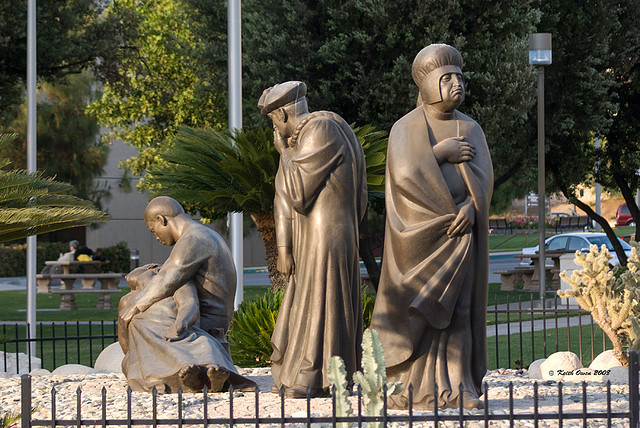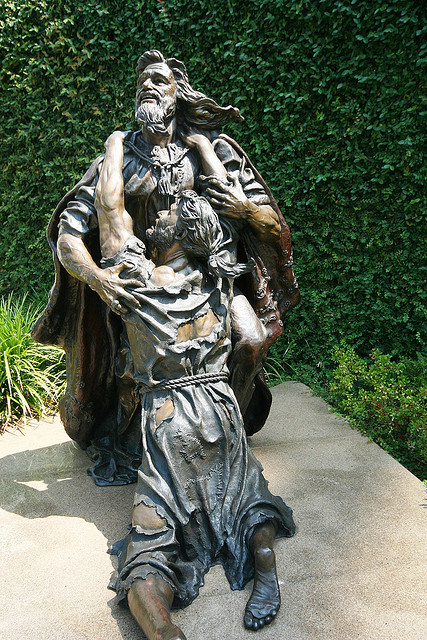Since the dawn of time, man has believed in and made space for the supernatural in his experiences – from animism to the Greek gods, and in organised religion such as the Abrahamic faiths (Judaism, Christianity and Islam), Buddhism etc we see man reaching out to the spiritual. Whether this interaction is carried out by the individual or through a medium, it is undeniable that man is a religious being, a meaning seeking being. Something within us cries out for something ‘without’ that cannot be filled by temporal possessions or relationships alone.

It is in this space that God exists. He demonstrated this by entering into a relationship with the children of Israel after taking them out of slavery in Egypt. It is in this space He entered into a relationship with the Prophet Mohammed that birthed Islam. It is in this space that, through the knowledge of Jesus Christ, He comes into a relationship with many. The very essence of the monotheistic religious experience is to create a relationship, a bond, between finitude and infinity – resulting in a way of life, a code of conduct for the individual and the group. Whether it is a discovery made by the individual themselves or one facilitated by someone else, religion is the confluence where God and man meet. Great biblical leaders such as Moses and Jesus were vital to the process and as such the role of modern day religious leaders becomes just as important as introducer, mentor and guide.
Something within us cries out for something ‘without’ that cannot be filled by temporal possessions or relationships alone.
Unfortunately, this sometimes is not the case. Instead of a merged relationship between all parties with God at the head, what usually happens is a loss of focus on the One who empowers the introducer; a removal of the One who matters from the equation. This is what happened at Sinai. Here, Moses had been away on the mountain top for over 40 days and the Israelites were getting impatient. In particular they said to Aaron, “…as for Moses, the man who brought us up out of the land of Egypt, we wot not what is become of him.” [1]Exodus 32:23 An interesting choice of words, because if we remember clearly, Moses wasn’t the one who brought them out of Egypt, it was God, Jehovah, I Am that I Am. Moses was just the messenger. Yet, they had decided that it was Moses who had brought them out of Egypt and not God. At that moment Moses was the god they worshipped, not the golden calf that came afterwards. This happens in many Christian organisations today. The words of the Israelites that day at the foot of the mountain echo the sentiment of many church-goers today. An example would be akin to someone saying that it is the power and prayer of their leader that solves their problems. Or that it the anointing on their leader that makes them rich; only after you have sown your seeds of tithes and offering, of course. Or that it is the presence of the leader that makes a difference in their church and their lives as a whole. Different circumstances, same disposition.
Why does this happen? Why was it that, in the case of the children of Israel, a people who had just a few chapters before seen a mountain quake and heard the voice of God personally, had so quickly forgotten who He was to them? Or, in the case of contemporary Christians, why are there churches filled with people who come into the church seeking a relationship with God and end up idolising the men and women of God instead?
Why are there churches filled with people who come into the church seeking a relationship with God and end up idolising the men and women of God instead?
I must start by acknowledging that by nature we Humans are inclined to defer to, uphold or glorify those things and people that we are in awe of. We find it easy to have faith in, trust or worship that which we can see, touch or understand. As a result, you might find that one of the qualities of a leader would be the ability to inspire trust, confidence and action. This is at play in politics, at work and within the religious environment. Some people who go to church to find God settle for the charismatic, enigmatic, fire-brand man or woman of God instead.
However, the calling of the man or woman of God imposes a duty to further the ministry of the church, which is ultimately to provide an enabling environment for individuals to connect with God. Therefore, it behoves the clergy to continuously deflect the attention of the people away from themselves back to the One who sent them. There are several biblical examples of men of God who did this. When the Israelites sought to make Gideon king, he refused to rule over them but instead redirected them to God. [2]Judges 8:22-23 Jesus continuously directed those who he healed or touched in one way or the other, back to God; always doing his best to divert attention away from himself. [3]Mark 5:18-20 Jesus added another dimension to this by telling his disciples that they are to permit others, who were not following him, to cast out demons in his name. [4]Mark 9:38-41 His preoccupation was with propagating the work of God and not building a church congregation for himself. Paul and Barnabas had a similar experience at Lystra. When the Lystrans sought to deify them, they redirected the people to God. [5]Acts 14:8-18 On another occasion Paul reprimanded the church in Corinthians for creating factions by following leaders instead of following God. [6]1 Corinthians 3:4-9 By doing so, Paul was able show the church that their faith was not based on who they followed or which church they attended, but on their personal relationship with God.
Whereas people have not changed, what seems to have changed is the approach some men and women of God take towards their calling. Sadly it appears that it is no longer about leading people to God and teaching them about Him in order to facilitate a relationship, but more about amassing large congregations. The result is a failure of leadership. The result is a generation of Christians who will make a god out of any minister that they think can solve any given issue. If they need deliverance, one minister can fix that and when they need a blessing, another minister will help with that. They have no real roots in the faith to understand that it is God that is the fixer, not man.
We all need to understand that all humanity is called to fellowship with God and leaders are placed in their positions in order to facilitate this process, not usurp the place of God in it.
There needs to be a realisation by religious ministers that the relationship between themselves and the congregation is one of brotherhood and not leader-follower. This was how Jesus described his relationship with his disciples and he took this further by describing as his brethren anyone who does the will of God. [7]Matthew 12:46-50 Again, Jesus took the focus back to God. When handing over to Joshua, Moses told him to ‘go with’ the Israelites into the Promised Land, as opposed to instructing him to ‘lead’ them. [8]Deuteronomy 31:6-7 Perhaps Moses realised at the end of his journey that he had not been able to draw the people closer to God in their hearts during his tenure by merely leading them; that maybe what was needed was a fellowship not a follower-ship.
This is a call to action, a call to re-examination, a call to re-orientation. God’s intention for establishing the role of ministers, and indeed any other type of religious leader, is primarily to feed his children with the knowledge and understanding of Him [9]Jeremiah 3:15 and ultimately for the edification of the church. [10]Ephesians 4:11-12 If as leaders, we are not feeding the flock with the knowledge of God we are failing in our responsibilities to each other and to God.


